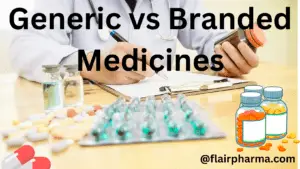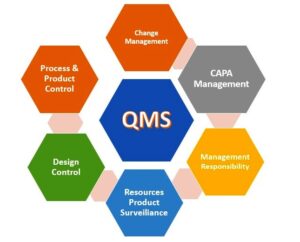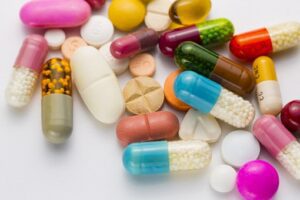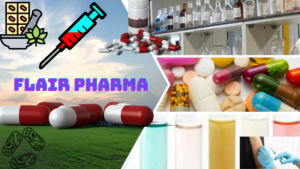In Generic vs Branded Medicines, Generic medicine refers to a pharmaceutical product that is equivalent to a brand-name (innovator) drug in terms of dosage, safety, strength, route of administration, quality, and intended use. The primary distinction between generic and brand-name drugs lies in their names and manufacturers.
Here are key points to understand about generic medicines:
- Active Ingredients:
- Generic medicines have the same active ingredients as their brand-name counterparts. These active ingredients are responsible for the therapeutic effects of the drug.
- Bioequivalence:
- Generic drugs must demonstrate bioequivalence to the brand-name drug. This means they should have similar pharmacokinetic and pharmacodynamic properties, ensuring comparable effectiveness and safety.
- Non-Proprietary Name:
- Generic drugs use the non-proprietary name of the active ingredient, providing a straightforward and universally recognized identification. For example, generic aspirin is labeled as “acetylsalicylic acid.”
- Cost-Effectiveness:
- Generics are typically more affordable than brand-name drugs. This cost difference is often attributed to the lower expenses associated with the development and marketing of generic drugs, as their manufacturers don’t need to conduct extensive clinical trials or invest heavily in branding.
- Regulatory Approval:
- Generic drugs go through a rigorous regulatory approval process to ensure their safety, efficacy, and quality. Regulatory agencies, such as the U.S. Food and Drug Administration (FDA), evaluate and approve generic drugs based on established standards.
- Patent Expiration:
- Generic drugs enter the market after the expiration of patents held by the original innovator drug manufacturer. Once a drug’s patent protection ends, other companies can produce and sell generic versions.
- Packaging and Appearance:
- Generic drugs may differ in appearance (color, shape, and packaging) from the brand-name drug, but they must meet the same standards for quality and effectiveness.
- Therapeutic Equivalence:
- Generic drugs are considered therapeutically equivalent to their brand-name counterparts. This means they can be substituted for the brand-name drug without any expected difference in clinical effect.
It’s important to note that while generic drugs offer a cost-effective alternative, patients should always consult with healthcare professionals to ensure that generic substitutions are appropriate for their specific medical conditions and needs in Generic vs Branded Medicines.
Generic Medicines:
- Composition:
- Contain the same active ingredients as the corresponding brand-name drugs.
- Must demonstrate bioequivalence to the brand-name drug, ensuring similar safety and efficacy.
- Name:
- Adopt the non-proprietary name of the active ingredient, leading to simpler nomenclature.
- Example: Generic aspirin is labeled as “acetylsalicylic acid.”
- Price:
- Typically more affordable than brand-name drugs due to increased competition when the original drug’s patent expires.
- Approval Process:
- Enter the market after the expiration of the brand-name drug’s patent.
- Subject to the same rigorous standards for safety, efficacy, and quality by regulatory authorities.
- Packaging and Appearance:
- May differ in appearance, color, and shape from the brand-name drug.
- Variances in packaging and labeling but adhering to strict regulatory guidelines.
- Advertising:
- Often marketed without extensive advertising campaigns, relying on the established efficacy of the active ingredient.
Branded Medicines:
- Composition:
- Proprietary formulations developed by pharmaceutical companies, often with a unique combination of active and inactive ingredients.
- Name:
- Assigned a brand or trade name that is typically easy to remember and promotes brand recognition.
- Example: Brand-name aspirin may be marketed as “Bayer” or another recognizable name.
- Price:
- Generally more expensive than generic counterparts, reflecting the costs associated with research, development, and marketing.
- Approval Process:
- Initially introduced to the market with a patent, granting exclusive rights to the pharmaceutical company for a specific period.
- Packaging and Appearance:
- Distinctive appearance and packaging to enhance brand recognition and establish a unique identity in the market.
- Advertising:
- Heavily promoted through advertising campaigns to build brand awareness and trust among consumers.
- May include educational materials and outreach to healthcare professionals.
Understanding the differences between generic and branded medicines is crucial for both healthcare professionals and consumers, enabling informed decisions based on factors such as cost, availability, and personal preferences in the Generic vs Branded Medicines.
Why does a generic drug look different from the brand drug?
| Aspect | Brand-Name Drug | Generic Drug |
|---|---|---|
| Name and Appearance | Has a unique brand name and distinctive appearance, including color, shape, and markings. | Uses the generic name of the drug but may have a different appearance, such as color, shape, or markings. |
| Packaging | It contains the same active ingredients and may have different inactive components. | Comes in generic packaging without the distinctive branding, often emphasizing the generic name. |
| Cost | Generally more expensive due to research and development costs. | Typically, it comes in branded packaging with the brand logo and design. |
| Ingredients | It contains the same active ingredients but may have different inactive components (fillers, binders). | They are produced after the brand-name drug’s patent expired, allowing other manufacturers to produce it. |
| Patent Exclusivity | Has patent protection, giving the manufacturer exclusive rights for a certain period. | They are produced after the brand-name drug’s patent expires, allowing other manufacturers to produce it. |
| Approval Process | Undergoes a comprehensive new drug application (NDA) process. | Undergoes an Abbreviated New Drug Application (ANDA) process, relying on the safety and efficacy data of the brand-name drug. |
| Regulatory Compliance | Must meet stringent FDA standards for safety, efficacy, and quality. | Subject to the same rigorous FDA standards to ensure bioequivalence and adherence to quality guidelines. |
Advantages & Disadvantages of the Generic vs Branded Medicines
| Aspect | Generic Medicines | Branded Medicines |
|---|---|---|
| Active Ingredients | Same as brand-name drugs | Proprietary formulations |
| Bioequivalence | Must demonstrate bioequivalence | Not required for brand-name drugs |
| Cost | Generally more affordable | Often more expensive |
| Approval Process | Stringent regulatory approval required | Extensive clinical trials and patents |
| Name | Non-proprietary name | Proprietary brand name |
| Packaging & Appearance | May differ in appearance | Distinctive appearance and packaging |
| Advertising | Limited marketing and advertising | Extensive advertising campaigns |
| Patent Expiration | Produced after brand-name patent expires | Initially introduced with a patent |
| Therapeutic Equivalence | Considered therapeutically equivalent | Therapeutically equivalent |
| Availability | Widely available after patent expiration | Exclusive rights during patent period |
| Market Competition | Increased competition lowers prices | Limited competition can maintain prices |
| Brand Recognition | Relies on active ingredient name | Promotes unique brand identity |
| Research and Development Costs | Lower development and marketing costs | Higher research and development costs |
| Consumer Trust | May be perceived as less established | Often associated with trust and quality |
| Physician Preference | Acceptance varies among healthcare pros | Often preferred due to familiarity |
Frequently Asked Questions about Generic vs Branded Medicines
Which medicine is better, generic or branded?
Answer: Both generic and branded medicines are considered equally effective and safe. The choice often depends on factors like cost, personal preferences, and the specific medical condition.
What are the disadvantages of generic medicine?
Answer: The disadvantages of generic medicines are generally minimal. However, some people may perceive differences in appearance or packaging, leading to concerns about efficacy, even though generic drugs undergo rigorous testing for safety and effectiveness.
Is generic medicine as safe as branded drugs?
Answer: Yes, generic medicines undergo the same stringent regulatory scrutiny as branded drugs to ensure safety, efficacy, and quality. Regulatory authorities require generic drugs to be bioequivalent to their brand-name counterparts.
Why don’t doctors prescribe generics?
Answer: Many doctors do prescribe generic medicines. However, in some cases, a physician may prefer a branded drug due to patient-specific considerations, familiarity, or potential variations in absorption that could impact certain individuals.
Why don’t generic drugs work?
Answer: Generic drugs are required to demonstrate bioequivalence to brand-name drugs, meaning they have the same therapeutic effects. Issues with generic drug effectiveness are rare and typically result from individual variations in response or, in some cases, misconceptions about generic medicines.
What is the primary difference between generic and branded medicines?
Answer: The main difference lies in their names and manufacturers. Generic medicines use the non-proprietary name of the active ingredient and are produced by companies other than the innovator.
Are generic medicines as effective as branded medicines?
Answer: Yes, generic medicines must demonstrate bioequivalence, ensuring they have the same therapeutic effects as their branded counterparts.
Why are generic medicines typically more affordable than branded ones?
Answer: Generic drugs are usually more cost-effective because their manufacturers don’t incur the high research and development costs associated with creating a new drug or conducting extensive marketing campaigns.
Do generic medicines undergo the same regulatory approval process as branded medicines?
Answer: Yes, generic medicines go through a rigorous regulatory process to ensure their safety, efficacy, and quality. They must meet the same standards as brand-name drugs.
Can generic medicines look different from branded medicines?
Answer: Yes, generic drugs may differ in appearance (color, shape, and packaging) from their brand-name counterparts. However, they must meet the same quality standards.
Why do branded medicines often cost more?
Answer: Brand-name drugs are initially introduced with a patent, granting exclusive rights to the pharmaceutical company. This exclusivity allows them to set higher prices to recoup research and development expenses.
Are generic medicines available for all branded drugs?
Answer: No, generic versions become available once the patent on the brand-name drug expires. Some drugs may not have generic alternatives if they are still under patent protection.
Do healthcare professionals prefer prescribing generic or branded medicines?
Answer: Preferences may vary, but many healthcare professionals acknowledge the therapeutic equivalence of generic medicines and may opt for them to reduce healthcare costs.
Is there a difference in the quality and safety of generic and branded medicines?
Answer: No, both generic and branded medicines must meet the same rigorous quality and safety standards set by regulatory authorities.
How does the availability of generic medicines impact market competition?
Answer: The availability of generic medicines increases market competition, leading to lower prices as multiple manufacturers produce the same drug after the patent expiration of the brand-name version.



